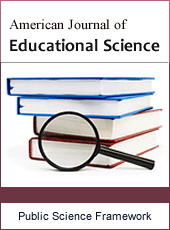American Journal of Educational Science
Articles Information
American Journal of Educational Science, Vol.1, No.2, May 2015, Pub. Date: Apr. 10, 2015
A New Simplified Approach for Learning Outcomes Assessment in Engineering Education Programs
Pages: 7-13 Views: 7099 Downloads: 1617
[01]
Ashraf Balabel, Mechanical Engineering Dept., Faculty of Engineering, Taif University, Al-Haweiah, Taif, Saudi Arabia; Mechanical Engineering Dept., Faculty of Engineering, Menoufia University, Shebin El-Kom, Menoufia, Egypt.
Engineering education programs are considered to provide future engineers with fundamental knowledge, professional skills and engineering ethics as well as the capability to deal with different and important society’s issues. The achievement of such goals is based on the students learning outcomes of the courses taught in a certain engineering program. Therefore, the assessment of learning outcomes is an important issue in engineering education programs. Moreover, most of accrediting agencies for academic engineering programs have been turned to increasing emphasis on the assessment strategic plans for programs to demonstrate its achievement of program objectives. Consequently, different assessment plans for educational objectives have been recently developed. The present paper introduces a new simplified approach for learning outcomes assessment in engineering programs. The proposed approach is based firstly on the preliminary determination of the course learning outcomes weight through the contact hours provided by the course director through different teaching methods. Secondly, a direct measure for the learning outcomes through different assessment methods is provided. The proposed approach determines the achievement of the program objectives in a simplified way and enables us to monitor and improve simply the courses contents in response to students’ performance or changes in modern engineering technology.
Engineering Education Programs, Learning Outcomes, Assessment Methods
[01]
ABET’s website: www.abet.org.Felder, R. M. And Brent, R. Designing and teaching courses to satisfy the ABET engineering criteria, Journal of Engineering Education, 92 (1), 7-25, 2003.
[02]
Wilczynski, D. and Ragusa, G. A Practical and comprehensive approach of assessing ABET outcome achievement in computer science and computer engineering, American Society for Engineering Education, 2012.
[03]
ABET, Criteria for accrediting engineering programs. Engineering Accreditation Commission, 2013, (http://www.abet.org/). Soulsby, E., How to write program objectives/outcomes accessed online at: www.assessment.uconn.edu, Feb. 9, 2011.
[04]
Krathwohl, D., A revision of Bloom’s Taxonomy: An overview, Theory into practice, Vol. 41, No. 4, pp. 1-54, 2002.
[05]
Bourner, T., Teaching methods for learning outcomes, Education + Training, Volume 39, Number 9, pp. 344–348, 1997.
[06]
Biggs, J. and Tang, C., Teaching for quality learning at university, Third Edition, Mcgrawhill, 2007.
[07]
Nightingale, P., Te Wiata, I.T., Toohey, S., Ryan, G., Hughes, C., and Magin, D., Assessing Learning in Universities Professional Development Centre, University of New South Wales, Australia, 1996.
[08]
Biggs, J. and Tang, C., Teaching for quality learning at university, Third Edition, Mcgrawhill, 2007.
[09]
Nightingale, P., Te Wiata, I.T., Toohey, S., Ryan, G., Hughes, C., and Magin, D., Assessing Learning in Universities Professional Development Centre, University of New South Wales, Australia, 1996.
[10]
Chandra, R. S., Omar F. and Essaid B., Continuous Improvement Process Based on Outcomes Based Education, Proceeding of the 2008 LAJC-IJME International Conference ISBN 978-1-60643-379-9, 2008.

ISSN Print: 2381-7127
ISSN Online: 2381-7135
Current Issue:
Vol. 6, Issue 2, June Submit a Manuscript Join Editorial Board Join Reviewer Team
ISSN Online: 2381-7135
Current Issue:
Vol. 6, Issue 2, June Submit a Manuscript Join Editorial Board Join Reviewer Team
| About This Journal |
| All Issues |
| Open Access |
| Indexing |
| Payment Information |
| Author Guidelines |
| Review Process |
| Publication Ethics |
| Editorial Board |
| Peer Reviewers |


